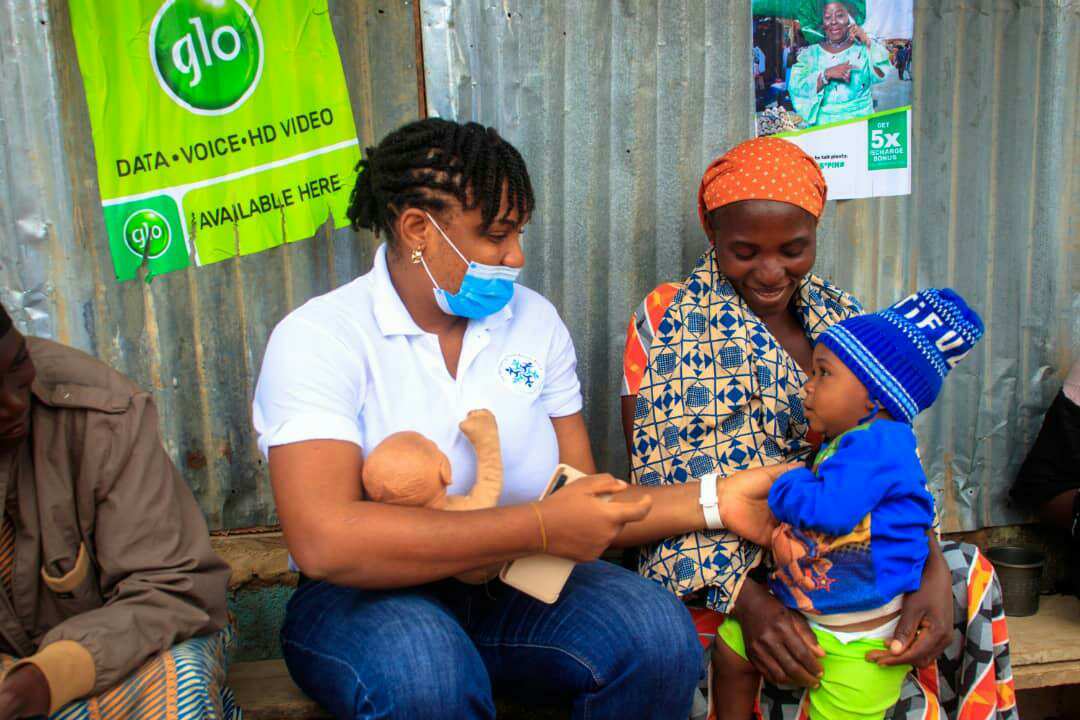as Wellbeing Foundation Africa Takes Sensitization To Communities
TOYIN ADEBAYO, ABUJA
As part of its activities to mark the World Breastfeeding Week (WBW), the Wellbeing Foundation Africa (WBFA) visited communities in the Federal Capital Territory, Lagos, Kwara and Osun states to sensitise women and men especially, on the benefits of exclusive breastfeeding to the new-born, mother and father.
This is as the foundation took its comprehensive sensitization exercise to the people of Ushafa, Dafa and Yangoji communities, highlighting the positive impacts of exclusive breastfeeding on the healthy development of the child, the short- and long-term health benefits for the mother, the health and financial benefits for the father, as well as its environmental benefits.
The World Breastfeeding Week is a celebration aimed at ensuring the actualization of the World Health Organization’s (WHO) goal of 50% exclusive breastfeeding by 2030. WBFA through its Alive and Thrive and Mamacare programs, has over the years educated women and trained midwives to eschew the practice of premature introduction of breast milk substitutes, this campaign has continued in the WBW2020.
The theme of the WBW2020 is “Support breastfeeding for a healthier planet”, highlighting the environmental impact of infant feeding. The theme aligns with thematic area 3 in the WBW-SDG 2030 campaign which focuses on how breastfeeding affects the environment and climate change.
Speaking on this, Founder of the WBFA, Her Excellency Toyin Ojora Saraki said
“I am delighted to note that the WBFA has increased its programmatic focus and social behavioural change advocacy and actions to engage husbands, and male community leaders, increasing their understanding of the benefits of early and exclusive breastfeeding, and the importance of sanitation and hygiene, from the cradle to age – I expect that with these improved inter-personal communication skills, men will better support new mothers in nourishing and nurturing their babies, strengthen household understanding, and cascade a lowering of sexual and gender based violence.
“Together with our new Neonatal Intensive Care Unit Lactation program, I am confident that the WBFA’s concrete steps to improve Maternal Infant And Young Child Feeding and Nutrition in Nigeria, will offer marked results in preventing malnutrition, from the most fragile infant to the healthy newborn and stronger child”
She added that, engaging local leaders, women groups in the markets, as well as adult men at their workplaces, the Foundation emphasized that exclusive breastfeeding provides the new-born child with critical nutrients necessary for healthy development and protects against deadly diseases such as pneumonia, diarrhoea and ear infections.
She further stated that, for mothers, the Foundation noted that exclusive breastfeeding would ensure the return to pre-pregnancy size of the mother’s uterus, and reduce the risk of ovarian and breast cancers.
WBFA also informed men that adhering to exclusive breastfeeding is cost-effective, as research has shown that the total annual global cost of not breastfeeding ranges from $257 billion to $341 billion, excluding economic costs of increased household caregiving time, as well as treatment costs related to other diseases caused by not practicing exclusive breastfeeding according to recommendations, she stated.
Meanwhile, the State Coordinator for WBFA in Abuja, Dr Otun Adewale who led the team said “Our internal data had shown that despite the health and financial benefits to the male folk especially fathers of new-borns, male involvement in the campaign for exclusive breastfeeding is awfully low. This informed our approach in the field exercise we took to these communities.
“Statistics show that 97% of children are actually breastfed in Nigeria but only 29% are exclusively breastfed. We have also noticed that socio-cultural factors come into play to reduce this 29%, so the target is to have at least 50% of exclusively breastfed children in Nigeria by 2030”.
Speaking on the effect of non-exclusive breastfeeding on the environment, Adewale emphasized that Nigeria being responsible for nearly 68% of nondegradable waste in Sub-Saharan Africa, could benefit significantly from exclusive breastfeeding.
While adding that; “The planet is degrading faster by the day and scientists have reported that the major cause of this degradation is solid waste. In Sub-Saharan Africa, we have about 62million tons of waste generated which is significant and unfortunately, Nigeria actually accounts for 42million tons of this waste, that is more than 60%. This is distorting our ecosystem, distorting our environment and degrading the planet as a whole.
“Exclusive breastfeeding is about the baby suckling from the mother’s breast, no need of cups or any other man-made tools, but breastmilk substitutes most times require these things. By 2030 importation of baby feed or substitute would be worth about N200billion which translates roughly to 100million cans of baby feed.
“These baby feed components are metal cans, aluminium foils, plastic spoons for scooping, etc. All these, after use, would be discarded somewhere mostly leading to environmental pollution. We can avoid all these by simply exclusively breastfeeding our children.” Adewale said.
WHO recommends that Exclusive Breastfeeding starts one hour after birth until the baby is 6 months old1, but sadly, in Nigeria, 29% of children are exclusively breastfed during the first 6 months of life.2 Among other factors militating against the practice of exclusive breastfeeding, the foundation noticed that the perception of men and the general public is critical in encouraging mothers to adhere to the practice. This finding informed the need to leverage on the celebration and expand coverage of the sensitization with emphasis on targeting men who are likely the key decision-makers in the family.

